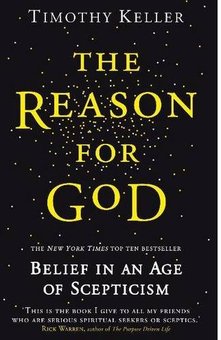BOOK REVIEWS
-
-

THE REASON FOR GOD:
BELIEF IN AN AGE OF SCEPTICISM
By: Timothy Keller
Publisher: Dutton with various reprints (2009 -)
ISBN-10: 1594483493 ISBN-13: 978-1594483493
This book is not new, but it is an excellent one which belongs here in the Reviews section of this site. The author begins by showing that whether we accept or reject the idea of God, we make a leap – whether it is a “leap of faith” or a “leap of doubt,” we choose between two possibilities in an alternate set of beliefs. As Keller maintains, we really can only make a choice as to which account of the world has the most “explanatory power” for us personally to make sense of what we see in the world and in ourselves. To presume that logic or faith alone somehow proves one choice over the other can be an error which is belied by the number of intelligent individuals who have chosen each kind of "leap."
The first half of the book looks at seven common arguments against God's existence, such as “How Could a Good God Allow Suffering?”, “Science Has Disproved Christianity” and “The Church Is Responsible for So Much Injustice”, while the seven chapters of the second half examine major arguments for God such as “The Clues of God” and “The Reality of the Resurrection.” While the book is neither a systematic treatment of all the arguments on either side, nor a totally in-depth philosophical treatment of the arguments covered, it is a well-written, accessible, and extremely worthwhile study. Keller engages his topics – both pro and con – in a fair and balanced manner and with a wide range of material which enhances understanding of the questions addressed.
The only reservation this reviewer would have in recommending this book is that it occasionally contradicts some of my own theological understandings, or only discusses one option when several are possible. For example, in the discussion of “How Can a Loving God Send People to Hell?” the book defends the common interpretation of the eternal punishing of sinners. This position ignores the viewpoint of many Christians who believe that the Bible actually teaches eternal punishment – meaning the destruction of the wicked rather than their eternal torment, or some other understanding of what lies beyond death (see the section “Beyond Hope, Beyond Pity” in the book Surprised by Hope by N. T. Wright in which Wright outlines the three main views). The Reason For God is therefore forced to defend one of several possibilities when other explanations may obviate the perceived problem.
The author does, however, make the excellent point that our perception of the punishment of evildoers (however it is understood) is largely culturally driven. As Keller rightly stresses, while our own culture may find the concept of eternal punishment disquieting and that of forgiveness admirable, other human cultures see things very differently – in some cases rejecting the idea of forgiveness of unrepentant evil as something that undercuts the very idea of what is right and wrong while believing that the concept of judgment and retribution is completely fair and righteous.
So, despite any reservation we might have regarding occasional differences of doctrinal understanding, it is perfectly possible to overlook areas of disagreement and to see the great value of this book. If readers can approach the book with a willingness not to balk simply because they might catch sight of ideas different to their own, they stand to profit tremendously from a work which thoughtfully and strongly defends Christian belief in our age of skepticism.